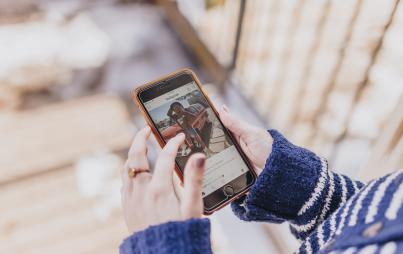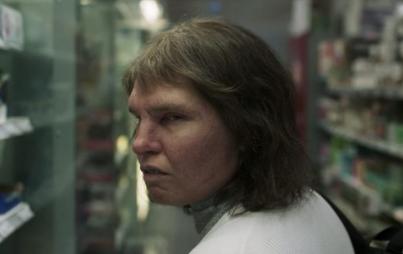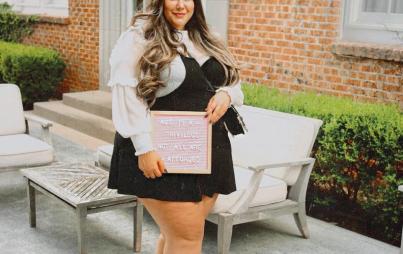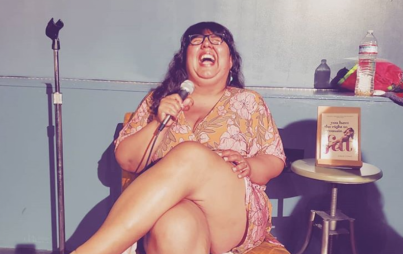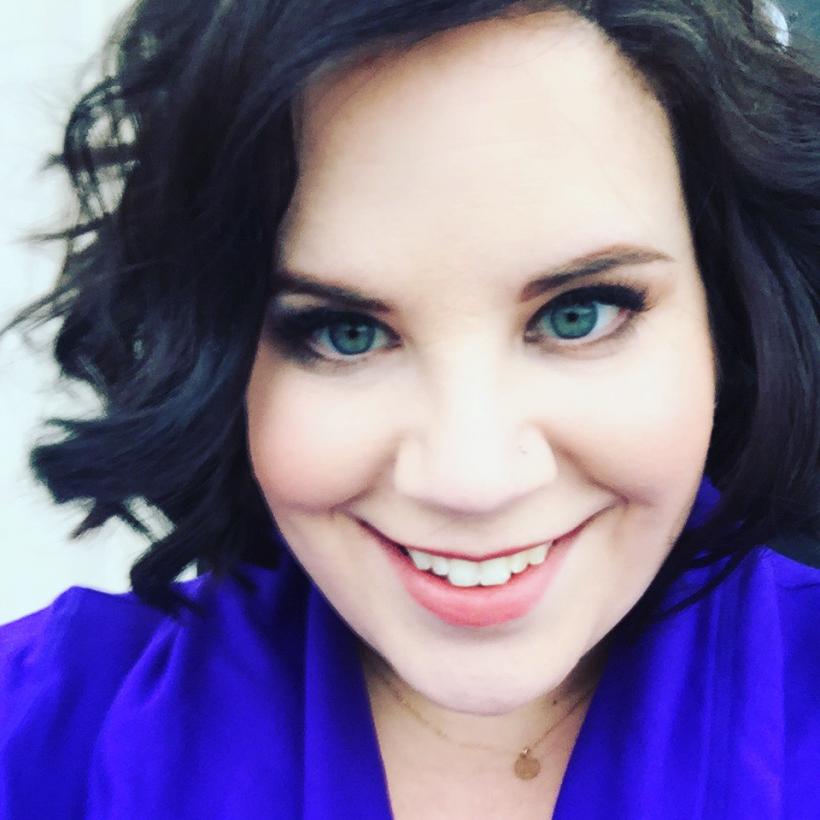
I talked to Whitney through a mutual friend's Facebook page. Unconventional, I know. I didn't know how I might get in touch with her, so I said to my platonic life-partner, Jes Baker, "Jes, can you tell Whitney I am not a creepy stalker and that I want to interview her."
And here we are.
There were a couple of obstacles in the way of our phone call (her father's car trouble and then her own flat tire, which is a lot of car issues to have), but we did it, and it was one of my favorite phone conversations ever. What I love about Whitney — besides that she's funny as hell — is she is genuine. That's a hokey thing to say, but it's true. I adore her, and I know you will, too.
You can see Whitney in "My Big Fat Fabulous Life" on TLC.
The fat girl dancing video was how everyone got to know you but what about before that?
I grew up a competitive dancer, teaching dance by the time I was 16. I was a competitive soccer player and really into theater, never more than 140 pounds.
By the time I was in middle school, I had an eating disorder. I'm not sure what it would be classified as now — I didn't binge much, I mostly purged. I would go through periods of restriction, like I can remember losing 30 pounds in one month. So I was already pretty fucked up.
When I went to college, I was planning on double majoring in theater and dance. But soon as I hit college, like before I was home for Christmas break, I had gained 50 pounds. I joked that it was the "Freshman 50," but I had no idea why. I remember waking up and having stretch marks all of a sudden. I was bumping into furniture because my body was changing so quickly I didn't have kinesthetic awareness.
Obviously, this was pretty depressing. I remember going to The Gap and getting a size 18 jeans (that was the biggest those jeans went) and I was like, "Oh my god, what am I going to do?”
At this point, I had stopped dancing. I was waiting to lose weight for my life to start.
Let me back up. One of the signs of PCOS that I always had was that I never had a period. I got my period when I was 16, had it for three months straight, and then stopped having it entirely. To this day, I've had it maybe 15-20 times. [But in college] I was just really embarrassed and ashamed and didn't know why I was so fat all of a sudden. I went to a nutritionist on campus. I told her that I wasn't getting my period, and I had gained all this weight, and she said, well you're drinking a lot and you're on birth control. She dismissed it as if it were normal.
I have no doubt that I would have gained weight like many college freshmen do — but by the end of my first year, I had gained 100 pounds. By the time I had gained 20 pounds, I dropped out of my dance class because I couldn't stand to look at myself in the mirror. I was actually on academic probation, which if you knew me, would be very shocking. I had always been a model student.
By my sophomore year, I stopped going to class. I thought about dropping out. I never did, which was good. Basically, everything was really shitty for a long time.
By my senior year, I had started to get myself together. I was doing OK in class at this point. I had gotten fat — I was probably 280 pounds. I had tried to lose weight all the ways I knew how, but nothing worked. Coupled with depression, and I was drinking a lot — I really had no desire to take care of myself.
I ended up dating a guy; I was 21, and he was 20. I ended up going to my gynecologist. She said, "I think you have PCOS. We're going to do some tests but basically you have two out of three symptoms." PCOS is so misunderstood. There is so little awareness about it and the diagnostic process is kind of ridiculous.
But I was losing hair on my head and growing hair on my face. So she diagnosed me, and then I was in this spot where I was like, what does this mean? I really then transferred some of the responsibility off myself. Because like I said, I had already struggled with eating disorders. My diagnosis really just raised more questions than it answered.
At this point, I had stopped dancing. I was waiting to lose weight for my life to start. This is just what I always knew. I didn't know how I was going to lose weight, but I was just waiting to figure out how that would happen so that I could be the person I could love.
I ended up going to Korea to teach English there, and did so for four years. I think it's different because in the West, body shaming is more covert, and in the East, it is more overt. I would be called a pig, was spat on. I was accosted in a bar. A guy came over and just started punching me in the head.
I felt this fire inside me, like I didn't deserve to be treated that way, but the answer for me was to lose weight. I didn't know how I was going to do that, but when I got home from Korea, which was December 2010, I started a weight-loss journey. I found a trainer who was a wonderful guy, an all-natural bodybuilder, and I was able to lose 100 pounds in eight months.
Unfortunately, at the time my goal was to still be my high school weight, which was 130 pounds. I was just totally focused on being thin and on what other people thought of me.
One day I had just run five miles and some guys drove by me and called me fat-ass. And I was like, you have no idea what I have just done. I just lost 70 pounds, and I ran five miles. I bet you couldn't do that. It was all just very upsetting
And in this weight-loss journey, my eating disorders came back. I was on an 1100 calorie-a-day diet, but eating far less than that. And on my cheat day, which was Friday, I would basically just binge and purge.
I ended up getting a job at a radio station as a morning personality. My schedule changed, and suddenly I was getting up at 2:30 in the morning. I didn't quit working out, but I was only working out three times a week instead of 15 hours. I was following my diet 70% of the time instead of 100%.
At this point, I was like 350 pounds. I was really depressed. This was 2013. And I thought I had ruined my life. I had gained all this weight back, and I only ever got to half of where I wanted to be. And I thought, what am I going to do?
And then I had this thought: What if losing weight wasn't the answer?
And so I started to just think about what would be good for me. And I decided I was going to look at opportunities, and if I wouldn't take something because I was fat, I was just going to do it anyway.
When I was losing weight, I had actually gotten my Zumba instructor license, which was the first time I had been dancing in 10 years. So I started making these videos with Todd, my dancing partner. I taught him how to dance in high school.
So my coworker was like, “Why don't you make a video set to popular music, and if you need a catchy title just call it 'Fat Girl Dancing?'” On the radio, I was talking about being fat, which was the first time I'd ever really discussed my weight. I was being really self-deprecating. I had never even spoke to my parents about my weight.
I never thought I could be happy like I was. But I am.
So I started to sort of self-actualize in a way, because I was talking about it with hundreds of thousands of people. I was getting a lot of feedback from our listeners, like, "Wow, a fat woman can be on the radio.” Which is interesting, because even in radio, where you're not seen, there still is the stereotype. So I started to do these videos, and they were getting some traction on our Facebook pages. Just from our followers.
I have this photographer friend who asked me to pose for a boudoir shoot. I was thinking I would never in my life to do that, but of course I was like, "What time should I be there?” I went and I did it. At that point I was the heaviest I have ever been, 350 pounds. And when the photos came back and I sat down to look at a slideshow of them with her, for the first time in my life, even at my heaviest, I thought they were beautiful.
I thought, oh my god, something must be changing in me. And I posted them on the Internet and got all of this positive (and also a lot of negative) feedback. So I started a blog called No Body Shame, and that was the first time I had ever used that term. And then in January 2014, that "Fat Girl Dancing" video went viral. Within a week I was getting calls from everybody.
And people were asking me to tell them about my campaign. And I was like, "Oh my god, this is just a blog. I don't know." And I thought, I can take this moment and make it my life or I can just let it go by and go back to work at the radio station for $8.50 an hour. So I just tried to take it, I tried to go with it, and that's where I am now.
That's the long story.
And even though I was on Good Morning America, I had never even heard of the term "body positivity." I didn't know who Tess was. I wasn't even on Instagram. But it was cool because once I had found it, I realized that all of these conclusions I had come to on my own were actually already a thing. And that was so gratifying and validating. It was really daunting to be thrown into this movement and looked at like a spokesperson. When all I really had was my experience.
I got an email from TLC about a month after the video went viral, and here I am.
I never thought I could be happy like I was. But I am.
I can’t remember any year what I did for my birthday, but I can always remember what I weighed.
Yeah, I can tell you what I weighed if I had lost even 5 pounds.
Loving myself was my own personal renaissance. Confidence is a product of action.
I can’t think of anything I wouldn’t do because of my weight.
I had my palm read in high school and she told me by my lifeline either I was going to physically die or have some sort of rebirth. When I look at my palm, I feel like my old life is over and my new life has begun.
WHOA. That is deep. I’m gonna need a second.
OK Tell me about the book.
I’m calling it I Do It With The Lights On. It’s a chronological memoir. What I really want people to know, I’m hoping this book falls into the hands not of someone who gets it, but of someone who needs it. I’m hoping people can just get a bigger picture — obviously it’s from my experience, but I think there is something universal. We all can relate to these feelings.
♦ ♦ ♦
This is the point in our phone call at which I stopped transcribing. Whitney and I talked for almost two hours that day. She's an incredible human. The end.




